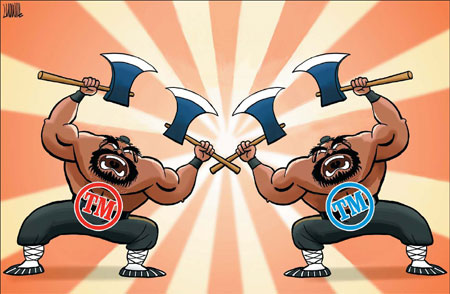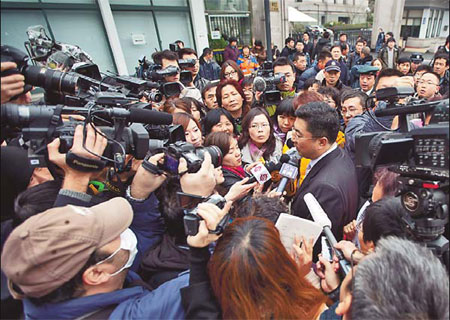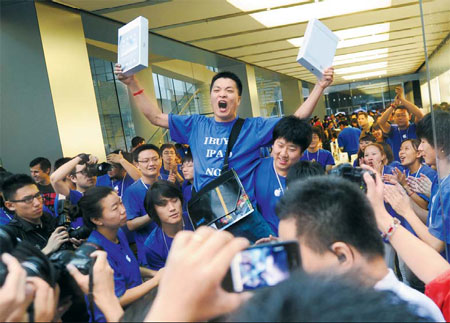Apple and Proview court controversy at iPad hearing
Updated: 2012-02-23 08:05
By Wu Yiyao and Tang Yue (China Daily)
|
||||||||
|
|
Heated exchanges in trademark dispute, report Wu Yiyao in Shanghai and Tang Yue in Beijing.
Attorneys for Shenzhen Proview Technology and Apple went head-to-head on Wednesday during a heated hearing in Shanghai over the bitter iPad trademark dispute.
The first session was adjourned after four hours, during which Proview denied having sold the right to use the iPad trademark to Apple, while the US tech giant rejected calls for a sales ban on its tablet computers.
Lawyers for the plaintiff and defendant were repeatedly admonished by the presiding judge and told to respect court protocol during arguments. No date was set for a verdict or second hearing.
At the heart of the dispute is the sale of the trademark by Proview's Taiwan affiliate to an Apple subsidiary in 2009.
Xie Xianghui, representing the Shenzhen LCD maker, argued that the transfer was invalid, as it was incomplete. In evidence, Proview presented its IPAD - Internet Personal Access Device - to show it was the first to register the trademark and produce a product.
Apple's use of the iPad name has also made it hard for the Chinese company to sell the trademark, such as to Chinese phone makers and PC maker, Xie said, adding that this means Proview may be unable to repay its bank debts.
However, Hu Jinnan, Apple's attorney, countered that Proview has not marketed or sold its IPAD for years, thus potentially invalidating its claim to the trademark.
The US tech firm also presented copies of e-mails as evidence that Proview was aware of the trademark sale and that the parent company was involved during the process.
A sales ban of the iPad in China will affect a large group, including consumers, added Hu.
Xie dismissed the argument and added that a block on the use of the trademark was unlikely to hurt Apple's profit margins.
Just 50 people were admitted into the gallery to watch the proceedings, which have attracted worldwide attention and thrown a spotlight on trademark disputes in China.
Shu Jianxin, an intellectual property attorney in Shanghai who has been following the case closely, said that if Proview is successful, Apple's tablet computers could be pulled from shelves within 48 hours.
Names cause friction
The China Trademark Office handled a record-breaking 1.07 million applications in 2010, the most reported anywhere in the world for the ninth consecutive year.
Yet, market analysts say the country should start to focus more on quality rather than quantity.
The number of world-famous brands originating in China is relatively small compared with the number of registered trademarks. In addition, experts say there are many mala fide applications, those made by individuals or companies who have no intention of using the trademark, which is disrupting the market.
There are hundreds of websites that offer customers the chance to register trademarks in China, the trade of which has become a business in itself.
"The function of a trademark is to give credit to a brand and help consumers to choose from different products on the market," said Liu Chuntian, an expert in intellectual property rights at Renmin University of China. "However, the buying and selling of trademarks has become an industrial chain. It's ridiculous."
Although the iPad dispute has caused concern among foreign companies about the use of their trademarks in China, some have attempted to prepare in advance.
Facebook, which is contemplating re-entering the Chinese market, according to media reports, began registering trademarks in China in 2006. So far, it has filed 61 applications for its English name and various Chinese translations, data from the China Trademark Office show.
Yet, intellectual property consultancy East IP, which was hired by the US social-network company to handle its trademark issues, told Reuters that it has found myriad variations on the Facebook name registered in China.
An executive was quoted as saying the firm is gathering evidence in the hope of reclaiming the trademark rights to the Facebook brand.
For foreign companies entering the Chinese market, registering English and Mandarin variations is essential, say lawyers.
Until recently, Sony Ericsson, one the world's largest cell phone producers, was embroiled in a legal battle with a digital company in Guangzhou that was selling products under the name Suo Ai, a widely used abbreviation of the multinational's Chinese name, Suo Ni Ai Li Xin.
Representatives of Sony Ericsson argued that most Chinese shoppers, when they heard the words "Suo Ai", would think of Sony Ericsson, not the Guangzhou brand.
A lawsuit was filed in 2007. However, judges in Beijing eventually ruled in favor of allowing the Guangzhou company to continue using the brand name, as it had been registered in China in 2004.
Law and order
China introduced its trademark law in 1982 and has revised it twice: in 1993, a year after the government unveiled plans to build a socialist market economy, and in 2001, after the country's entry into the World Trade Organization.
The law today is far more detailed than in its original form, yet experts say there are still holes that need to be filled before the interests of enterprises and consumers can be guaranteed.
Experts say the disputes result from a fundamental difference in the systems used by various countries. In developed nations such as the United States and Britain the right to use a trademark is granted to the individual or company who first uses it.
However, in China, the right goes to the first person to file a patent application.
Although the current system is easier for Chinese judges, Zhang Yumin, who heads the School of Intellectual Property at Southwest University of Political Science and Law, said the first-to-use rule employed in the West says more about the relationship between the trademark and the product.
"The value of a trademark lies in the product," she said. "A trademark should not be given to those who don't have any business interest in the market, and there should be severe punishments for those who make mala fide applications.
"Some countries require newly registered trademark owners to show evidence of their production for the previous five years. If they can't produce this, the trademark can be revoked," she added. "We can learn from this practice."
According to Zhang, the trademark law in Japan was revised five times between 2003 and 2008, while the US amended its regulations 14 times between 1946 and 1995, an average of once every four years.
China is more cautious about revising laws, however. Authorities began a review of the trademark law in 2005 and released a draft of the amended regulations for public opinion in September.
Yet, when it comes to addressing the problem highlighted by the Proview-Apple dispute, Liu at Renmin University of China said: "I don't see much improvement in the new draft. It still promotes the power of registration."
|
|
Changing attitudes
Chinese enterprises have also faced trademark wrangles in overseas markets.
Lenovo, the world's second-largest PC maker, originally used the name Legend abroad. However, it changed the name in 2004 due to a conflict with trademarks registered in Western countries.
Likewise, Hisense Group ran into difficulties in 2000 when it attempted to enter the German market. The name Hisense, it discovered, had already been registered in the country by a Siemens-Bosch joint venture.
The white-goods manufacturer made an initial offer to buy the trademark from its competitor but balked at the asking price, reported to be in the region of 40 million euros ($52 million).
Five years and several court hearings later the companies reached an out-of-court agreement in which Hisense paid an undisclosed amount to use the name in Europe.
|
|
"In the age of multinationals, it's not unusual to see such cases around the world, especially those related to China," said intellectual property expert Feng Xiaoqing at the China University of Political Science and Law.
"Chinese companies have just started the globalization process and some are still learning to defend their interest," he said. "Meanwhile, China is a booming market and has attracted companies from around the globe. That naturally increases disputes."
Liu at Renmin University added that at the root of the problem is the ideology of the planned economy.
"Some Chinese people are still after a free ride and haven't learned to respect the property of others, especially when it comes to intangible property like trademarks," he said.
"It takes a long time to revise and implement a law; it may take longer to change people's attitudes."
Contact the reporters at tangyue@chinadaily.com.cn or wuyiyao@chinadaily.com.cn

 Relief reaches isolated village
Relief reaches isolated village
 Rainfall poses new threats to quake-hit region
Rainfall poses new threats to quake-hit region
 Funerals begin for Boston bombing victims
Funerals begin for Boston bombing victims
 Quake takeaway from China's Air Force
Quake takeaway from China's Air Force
 Obama celebrates young inventors at science fair
Obama celebrates young inventors at science fair
 Earth Day marked around the world
Earth Day marked around the world
 Volunteer team helping students find sense of normalcy
Volunteer team helping students find sense of normalcy
 Ethnic groups quick to join rescue efforts
Ethnic groups quick to join rescue efforts
Most Viewed
Editor's Picks

|

|

|

|

|

|
Today's Top News
Health new priority for quake zone
Xi meets US top military officer
Japan's boats driven out of Diaoyu
China mulls online shopping legislation
Bird flu death toll rises to 22
Putin appoints new ambassador to China
Japanese ships blocked from Diaoyu Islands
Inspired by Guan, more Chinese pick up golf
US Weekly

|

|









